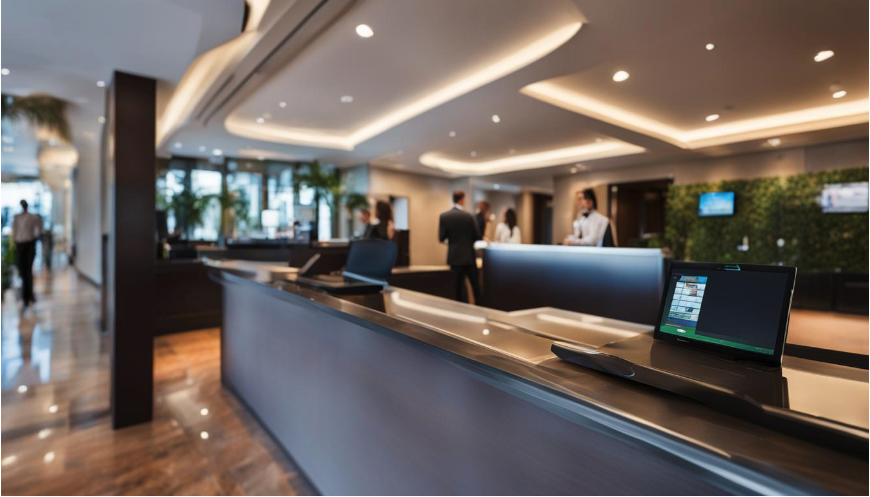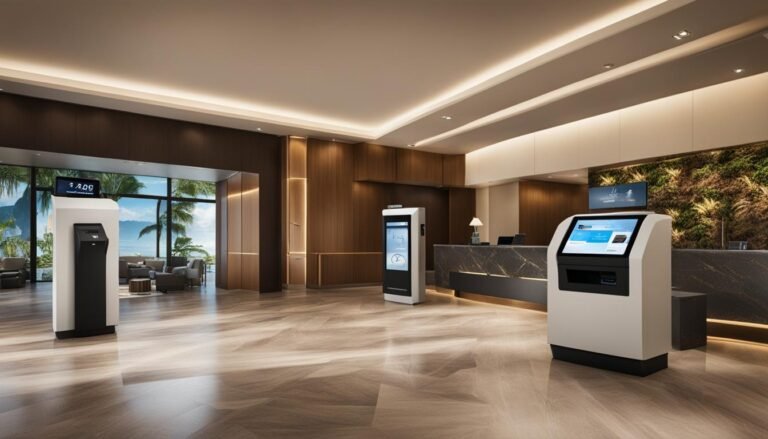Master the Art of Managing Hotel Reservations Efficiently
Managing hotel reservations is a crucial aspect of running a successful hotel business. By effectively managing hotel reservations, hoteliers can optimize revenue, improve customer satisfaction, and streamline operations. In this article, we will explore the key strategies and techniques for efficient hotel reservation management.
Effective hotel reservation management involves various elements such as pricing, distribution, and market segmentation. By analyzing data, hotel operators can anticipate demand fluctuations and make necessary adjustments in pricing. Dynamic pricing strategies and setting competitive prices relative to competitors can help maximize returns.
Creating an efficient distribution strategy and utilizing data effectively are also essential. This includes adding agents to the distribution network strategically and increasing opportunities for direct bookings. By understanding and controlling a hotel’s room inventory, hoteliers can ensure efficient operations and cater to the needs of their target market segment.
Key Takeaways:
- Managing hotel reservations efficiently is crucial for maximizing revenue and enhancing guest satisfaction.
- Effective hotel reservation management involves pricing, distribution, and market segmentation.
- Analyzing data helps anticipate demand fluctuations and adjust pricing strategies accordingly.
- A well-designed distribution strategy and focus on direct bookings contribute to efficient hotel reservation management.
- Understanding and controlling room inventory is essential for meeting the needs of the target market segment.
Importance of Hotel Inventory Management
Efficient hotel inventory management is crucial for maximizing revenue and delivering a seamless guest experience. By effectively managing hotel room inventory, hoteliers can adapt to fluctuating demand, set competitive prices, and leverage distribution channels to their advantage. It allows them to make data-driven decisions, optimize revenue processes, and respond quickly to customer needs. In addition, hotel inventory management helps forecast and segment target markets, ensuring a diverse range of offerings to accommodate different guest preferences and budget levels.
Through effective room inventory strategies, hotels can strike a balance between inventory levels and revenue, improve distribution strategies, and enhance overall operational efficiency. By analyzing inventory and rates, hoteliers gain insights into market trends and can make informed pricing decisions. This enables them to optimize revenue potential while maintaining competitiveness.
Implementing a hotel reservation system plays a significant role in efficient inventory management. It allows hoteliers to streamline operations, automate processes, and centralize data for better decision-making. A robust reservation system enables seamless inventory management, pricing control, and distribution channel management, contributing to improved revenue and guest satisfaction.
“Efficient hotel inventory management is essential for maximizing revenue and delivering a seamless guest experience.”
“By effectively managing hotel room inventory, hoteliers can adapt to fluctuating demand, set competitive prices, and leverage distribution channels to their advantage.”
Hotel inventory management goes beyond simply managing available rooms; it encompasses the art of understanding and anticipating guest preferences and market trends. It enables hotels to optimize revenue potential, enhance operational efficiency, and stay ahead of the competition in today’s dynamic hospitality industry.
Streamlining the Workflow of Hotel Front Desk
The efficient management of a hotel front desk is crucial for ensuring a seamless guest experience. By streamlining the workflow and utilizing a reliable hotel booking system, hoteliers can enhance operational efficiency and improve guest satisfaction.
One effective strategy for streamlining the workflow of the front desk is to create a clear schedule for staff members. This involves assigning specific roles and responsibilities, ensuring that each team member knows their tasks and duties. By establishing a well-organized schedule, hotels can minimize confusion and ensure that all necessary tasks are completed in a timely manner.
An essential tool for front desk management is a reliable hotel booking system. This software enables hotels to efficiently manage reservations, check-ins, and check-outs. It automates processes, reducing the chances of error and improving overall efficiency. Additionally, a hotel booking system allows for easy tracking of room availability, simplifies the reservation process, and provides a centralized database of guest information, facilitating personalized interactions.
Effective communication and collaboration among staff members and other departments are also crucial for streamlining front desk operations. By fostering open lines of communication, hoteliers can ensure that information flows smoothly between departments, allowing for quick and efficient resolution of guest requests and inquiries. Regular meetings and training sessions can further enhance communication and reinforce teamwork among staff members, leading to more efficient front desk operations.
Key Benefits:
- Enhanced operational efficiency
- Improved guest satisfaction
- Minimized confusion and errors
- Streamlined reservation process
- Centralized guest information
- Effective communication and collaboration
The Evolution of Hotel Sales Management
The hotel sales management landscape has undergone significant transformations throughout history. From personal relationships and word-of-mouth referrals to the advent of global distribution systems (GDS) and the internet revolution, the industry has witnessed a remarkable shift in sales strategies. With the rise of online travel agencies (OTAs) and the increasing transparency of pricing, hoteliers have had to adapt and develop new approaches to stay competitive in the market.
One of the key trends in hotel sales management is the shift towards direct bookings. Hotels are now focusing on driving more direct bookings through their websites, mobile apps, and social media platforms. By reducing reliance on OTAs, hotels can minimize commission fees and gain more control over their distribution channels. Additionally, many hotels are implementing revenue management strategies to optimize pricing based on demand, thereby ensuring maximum profitability.
Leveraging online reviews has also become a crucial aspect of hotel sales management. With the increasing influence of user-generated content, positive reviews and ratings can significantly impact a hotel’s reputation and attract more guests. Hotels are actively monitoring and responding to online reviews, focusing on enhancing guest experiences and addressing any concerns or issues raised by guests.
Table: Evolution of Hotel Sales Management
| Era | Sales Strategies |
|---|---|
| Personal Relationships and Referrals | Relied on personal connections, word-of-mouth referrals, and local advertising |
| Global Distribution Systems (GDS) | Utilized GDS to reach a wider audience and expand distribution networks |
| Rise of Online Travel Agencies (OTAs) | Incorporated OTAs to increase visibility and reach a global market |
| Direct Bookings and Revenue Management | Emphasized direct bookings and implemented revenue management strategies for optimal pricing |
| Online Reviews and Reputation Management | Focused on managing online reviews and building a positive reputation |
In conclusion, the evolution of hotel sales management has been shaped by changes in technology, consumer behavior, and market dynamics. Hoteliers are now employing innovative strategies to drive direct bookings, optimize revenue, and enhance guest experiences. As the industry continues to evolve, data-driven decision-making and personalized marketing campaigns will play an increasingly vital role in hotel sales management.
Key Strategies to Improve Hotel Room Sales
Driving hotel room sales requires a strategic approach that encompasses various key strategies. By implementing these strategies, hoteliers can enhance their sales efforts and maximize revenue. Here are some effective techniques to improve hotel room sales:
1. Hotel Group Sales Strategy
Implementing a hotel group sales strategy can be a game-changer for capturing corporate group bookings and leveraging meeting spaces. This strategy involves targeting businesses and organizations that require accommodation and event venues for their employees or clients. Building relationships with event planners, attending industry trade shows, and offering attractive packages tailored to group needs can help hotels secure these lucrative bookings.
2. Direct Hotel Sales Strategy
Emphasizing direct bookings is another essential strategy for increasing hotel room sales. By promoting the advantages of booking directly with the hotel, such as best rate guarantees, exclusive perks, and personalized customer service, hoteliers can entice guests to bypass online travel agencies (OTAs) and book directly. Having an easy-to-use online booking system and maintaining an active presence on social media can further support the success of this strategy.
3. Destination Marketing Sales Strategy
Collaborating with other tourism businesses and organizations in the local region can significantly boost hotel room sales. By participating in destination marketing campaigns, hoteliers can attract travelers who are interested in exploring the area and experiencing what it has to offer. This strategy involves promoting local attractions, events, and activities in partnership with other businesses to create a comprehensive and enticing destination experience for potential guests.
4. Cross-Promotional Strategies
Capitalizing on local events and festivals is an effective way to drive hotel room sales. Hotels can create cross-promotional partnerships with event organizers and offer special packages or discounts to attendees. By aligning their marketing efforts with popular events, hotels can attract visitors who are in need of accommodation during these occasions.
5. Loyalty Programs and Guest Rewards
Implementing loyalty programs and guest rewards initiatives is a proven strategy for driving repeat bookings and enhancing guest satisfaction. By offering exclusive perks, discounts, and personalized experiences to loyal customers, hotels can foster long-term relationships and encourage guests to choose their property for future stays.
By implementing these key strategies, hotels can increase their room sales, boost revenue, and establish a strong foothold in a competitive market. Tailoring these strategies to suit the unique characteristics and target market of the hotel is crucial for achieving optimal results.
| Strategy | Description |
|---|---|
| Hotel Group Sales Strategy | Targeting corporate group bookings and meeting spaces |
| Direct Hotel Sales Strategy | Promoting direct bookings and bypassing OTAs |
| Destination Marketing Sales Strategy | Collaborating with local businesses to promote the destination |
| Cross-Promotional Strategies | Capitalizing on local events to drive bookings |
| Loyalty Programs and Guest Rewards | Incentivizing repeat bookings and enhancing guest satisfaction |
Optimal Strategies for Hotel Front Desk Management
Effective hotel front desk management is vital for ensuring smooth operations and delivering exceptional guest experiences. From hiring and training skilled staff to streamlining workflows and utilizing user-friendly software systems, there are several key strategies that hoteliers can implement to optimize front desk management.
Hiring and Training:
The first step in effective front desk management is hiring the right staff members with excellent communication, customer service, problem-solving, and multitasking skills. Providing comprehensive training programs that cover various scenarios and emphasize the importance of guest satisfaction is essential. Ongoing training and development opportunities should also be offered to ensure staff members stay updated with industry trends and best practices.
Workflow Organization:
Organizing and streamlining the workflow at the front desk is crucial for efficient operations. This involves creating a consistent schedule that ensures adequate coverage during peak hours, assigning specific roles and responsibilities to each staff member, and implementing user-friendly software systems for smooth check-ins, check-outs, and reservations. By establishing clear protocols and checklists, hotels can minimize errors and confusion, ensuring a seamless guest experience.
Effective Communication and Collaboration:
Effective communication and collaboration between front desk staff members and other departments are key for seamless operations. Regular team meetings, open lines of communication, and shared platforms for information exchange help ensure that all departments are aligned and working towards a common goal. Collaboration with housekeeping, maintenance, and other teams is crucial for responding promptly to guest requests and resolving any issues that may arise during a guest’s stay.
In conclusion, implementing optimal strategies for hotel front desk management is essential for delivering excellent guest experiences and ensuring efficient operations. By hiring and training the right staff, organizing workflows, and fostering effective communication and collaboration, hotels can streamline front desk operations and provide a seamless and memorable stay for their guests.
Improving Hotel Sales Strategies
When it comes to hotel sales strategies, there are several key areas that hoteliers can focus on to drive success. From OTA optimization to leveraging online reviews, implementing these strategies can significantly impact a hotel’s revenue and reputation.
OTA Optimization
Online Travel Agencies (OTAs) play a crucial role in hotel sales, as they are often the first point of contact for potential guests. To optimize results on OTAs, hoteliers should pay attention to factors such as high-quality photos, detailed descriptions, and managing rates and availability effectively. By doing so, they can attract more bookings and improve their visibility on these platforms.
Leveraging Online Reviews
Online reviews have become a powerful tool for hotel sales. Positive reviews build trust and credibility among potential guests, leading to increased bookings. To leverage online reviews effectively, hoteliers should encourage guests to leave reviews and actively respond to feedback. By addressing any concerns or issues raised by guests, hotels can demonstrate their commitment to customer satisfaction and attract more bookings as a result.
The Role of Data in Hotel Sales Management
Data-driven sales management and hotel data analytics play an integral role in the success of hotel reservation management. By leveraging data insights and analysis, hoteliers can make informed decisions to optimize revenue and enhance guest satisfaction. Key performance indicators such as occupancy rates, average daily rate (ADR), and revenue per available room (RevPAR) provide valuable insights into the performance of sales strategies. Through data analytics, hoteliers can identify trends, forecast demand, and adjust pricing strategies to maximize profitability.
Furthermore, data-driven sales management allows hoteliers to segment their target markets effectively. By analyzing customer preferences, behavior patterns, and booking trends, hoteliers can tailor their marketing campaigns and offerings to specific guest segments. This level of personalization helps create targeted messaging that resonates with potential guests, resulting in higher conversion rates and increased bookings.
Hotel data analytics also enables hoteliers to track the effectiveness of their distribution channels and make data-backed decisions. By monitoring the performance of online travel agencies (OTAs), direct bookings, and other distribution channels, hoteliers can allocate their resources effectively and optimize their distribution strategy. This ensures that the right rooms are available on the right channels at the right time, maximizing visibility and revenue.
“Data-driven sales management enables hotels to optimize revenue, improve guest satisfaction, and meet the needs of their target markets.”
| Data-Driven Sales Management Benefits | Hotel Data Analytics |
|---|---|
|
|
|
|
In conclusion, data-driven sales management and hotel data analytics enable hoteliers to make data-backed decisions, optimize revenue, and meet the evolving needs of their target markets. By leveraging data insights, hoteliers can enhance guest satisfaction, personalize marketing campaigns, and maximize profitability. Incorporating data-driven strategies into hotel reservation management ensures that hotels stay competitive in the rapidly evolving hospitality industry.
The Impact of Technology on Hotel Sales Management
Technology has rapidly transformed the hotel industry, revolutionizing various aspects of hotel sales management. From the advent of global distribution systems (GDS) to the rise of online travel agencies (OTAs) and hotel booking systems, technology has become an essential tool for hoteliers to streamline operations and drive revenue.
One of the key areas where technology has made a significant impact is in inventory management. Hoteliers can leverage advanced software systems to monitor and optimize room availability, rates, and distribution across multiple channels. With real-time data and analytics at their fingertips, hoteliers can make data-driven decisions to maximize occupancy and revenue.
Moreover, technology has empowered hoteliers to enhance guest communication and engagement. With the rise of mobile apps and online platforms, hoteliers can provide personalized experiences and instant customer service. This not only improves guest satisfaction but also boosts loyalty and drives direct bookings.
Additionally, technology has enabled hotels to leverage data analytics to gain deeper insights into guest preferences and behavior. By analyzing customer data, hotels can create targeted marketing campaigns, offer personalized promotions, and improve overall guest experiences. Technology also facilitates revenue management, allowing hotels to adjust pricing dynamically based on demand and market conditions.
In conclusion, technology has had a profound impact on hotel sales management. From inventory management to guest communication and data analytics, technology has transformed the way hotels operate and engage with their customers. Embracing technology and staying up-to-date with the latest advancements will be crucial for hoteliers to stay competitive and thrive in the ever-evolving hotel industry.
The Future of Hotel Reservation Management
As the hotel industry continues to evolve, so does the management of hotel reservations. The future of hotel reservation management is shaped by advancements in technology, changing guest preferences, and emerging industry trends. Hoteliers must stay ahead of the curve to effectively navigate this dynamic landscape and provide exceptional guest experiences.
One of the key trends in hotel reservation management is the integration of artificial intelligence (AI) and machine learning. These technologies enable hotels to personalize guest experiences by analyzing data and understanding individual preferences. AI-powered chatbots provide efficient and seamless reservation processes, handling guest inquiries and bookings with speed and accuracy. Machine learning algorithms help hotels optimize pricing strategies and revenue management, ensuring maximum profitability.
Another future trend in hotel reservation management is the utilization of mobile apps and virtual reality (VR) experiences. Mobile apps offer convenience and flexibility for guests to make reservations, access hotel information, and manage their bookings on the go. VR experiences provide immersive previews of hotel rooms and amenities, allowing potential guests to make informed decisions. These technologies enhance the booking process and provide a more engaging and interactive experience for guests.
Furthermore, data-driven decision-making will continue to play a crucial role in hotel reservation management. Hotels collect vast amounts of data from various sources, including guest preferences, booking patterns, and market trends. By leveraging this data, hoteliers can make informed decisions about pricing strategies, distribution channels, and marketing campaigns. Data analytics tools enable hotels to identify trends, forecast demand, and target specific market segments effectively.
Conclusion
In conclusion, effective hotel reservation management is crucial for maximizing revenue, guest satisfaction, and overall operational efficiency. By mastering the art of managing hotel reservations efficiently, hoteliers can stay ahead in a competitive industry.
Key strategies such as dynamic pricing, direct bookings, OTA optimization, loyalty programs, and data-driven decision-making play a vital role in achieving success. Hoteliers should also embrace technology advancements, such as AI, automation, and data analytics, to enhance the reservation process and deliver personalized guest experiences.
As the future of hotel reservation management continues to evolve, staying proactive, continually learning, and adapting to market trends will be essential. By keeping a close eye on industry developments and embracing sustainability practices, hoteliers can navigate the changing landscape with confidence.
Source Links
- https://www.siteminder.com/r/hotel-inventory-management/
- https://www.linkedin.com/advice/0/what-some-effective-strategies-managing-hotel-front
- https://www.siteminder.com/r/hotel-distribution/hotel-revenue-management/strategies-increase-hotel-room-sales/







